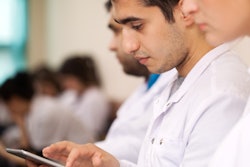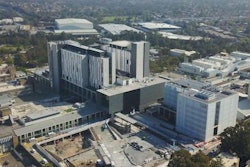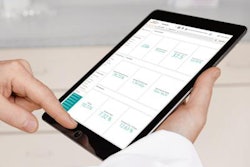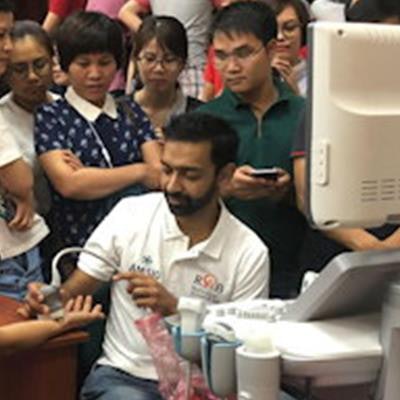
A new educational course spearheaded by the Australian-based charity Radiology Across Borders (RAB) promises to improve patient access to imaging services worldwide. Aimed predominantly at those in the developing world or remote areas, it will focus on safety and interpreting common pathologies such as pneumonia, bleeds, trauma, meningitis, bone tumors, and emergency conditions.
The International Certificate in Radiology Fundamentals (ICRF), a one-year online program, is due to launch in February 2021 to allow any health professional to learn the basics of x-ray, ultrasound, and CT in order to perform and read exams.
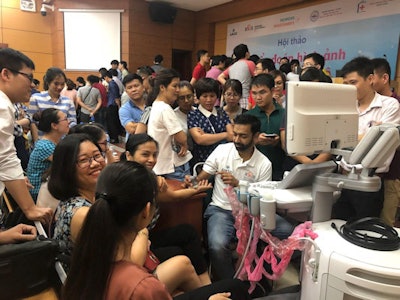 Practical hands-on training in south-east Asia is provided by Dr. Salman Ansari, a final-year radiology registrar at Royal Prince Alfred Hospital in Sydney and director of RAB's collaboration with the Australasian Musculoskeletal Imaging Group (AMSIG). All photos taken before COVID-19 pandemic and courtesy of Dr. Suresh de Silva & RAB.
Practical hands-on training in south-east Asia is provided by Dr. Salman Ansari, a final-year radiology registrar at Royal Prince Alfred Hospital in Sydney and director of RAB's collaboration with the Australasian Musculoskeletal Imaging Group (AMSIG). All photos taken before COVID-19 pandemic and courtesy of Dr. Suresh de Silva & RAB.Besides coursework, there will be regular meetings between the course's tutors and the 50 participants. The final ICRF will be attained on completion of the course. It will be accredited by a major institution and represent the equivalent knowledge base of a second-year registrar in a developed country.
"This is going to make a huge difference to radiology education in developing nations. We've already had 185 individual expressions of interest from 60 countries," noted radiologist and RAB founder Dr. Suresh de Silva, pointing to inquiries from the Indo-Pacific, Mongolia, Vietnam, Colombia, Africa, Algeria, Kenya, and Ethiopia.
He also noted there had been applications from the U.K., Israel, Ireland, Germany, Serbia, Hungary, Australia, New Zealand, and North America, though these nations will not receive priority in the first year. Health professionals may eventually use the certificate as a steppingstone to further radiology specialization training, he said.
How the scheme works
Each participant from developing nations will pay a total of 500 Australian dollars (320 euros) for the entire year's course, though there is RAB funding for those that can't afford it, noted de Silva. The fee will help sustain the project longer term. It is estimated that the first year of operation will cost the organization close to around $100,000 (64,000 euros) for the IT platform and project coordination, and this isn't factoring in pro bono work by the 14 Australian RAB members who helped create the content and will serve as tutors, as well as the four volunteer Canadian medical students.
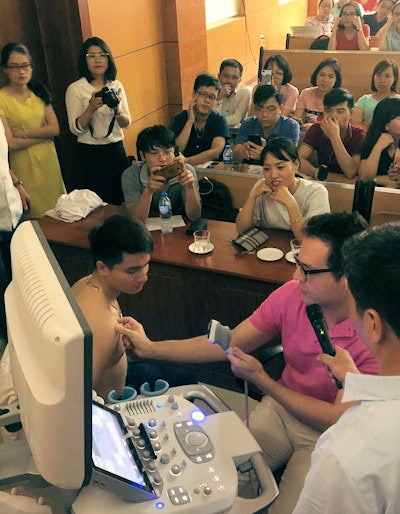 Dr. George Koulouris, a sports and musculoskeletal radiologist at Melbourne Radiology Clinic, gives a hands-on teaching session in Hanoi, Vietnam.
Dr. George Koulouris, a sports and musculoskeletal radiologist at Melbourne Radiology Clinic, gives a hands-on teaching session in Hanoi, Vietnam.Furthermore, RAB estimates that the four years of research and development of ICRF have cost over a million dollars, including the IT and volunteer work.
"Importantly, this ICRF initiative will lead to other projects. For example, some participants will have access to imaging units while others won't. Companies involved with RAB projects both financially and logistically, such as Siemens Healthineers, hopefully will come to the fore for the provision of such equipment to those that complete the training, particularly in countries where RAB doesn't yet send its own radiologists to undertake field work," de Silva noted.
While this project was formulated by RAB over four years, the core part of the content comes from the U.K. Royal College of Radiologists' (RCR) online Radiology-Integrated Training Initiative (R-ITI) course (eIntegrity). Input has also come from Radiopaedia.org, a wiki-based collaborative educational radiology web resource, and the many RAB radiologists who contributed around 30% of the program by providing their own material, including video tutorials.
Prof. Bruce Forster, head of radiology at University of British Colombia (UBC) in Canada, and Prof. Richard Mendelson, emeritus consultant at the Royal Perth Hospital in Australia, have also been instrumental in the development of the ICRF, de Silva added.
Ongoing projects
RAB is continuing its existing educational programs in the form of global teleconferences on different themes; the RABinars for radiologists which will take place every three weeks in 2021 and the RABitts conferences for imaging technologists will occur monthly. These broadcast to 400 sites in 58 countries.
The charity also aims to provide a timely response to new topics that arise, such as COVID-19, creating lectures and Q&A sessions that can be mailed out to its recipients in developing nations within a week.
RAB's 2019-created TIDES project provides teleradiology for disaster events, screening, and second opinions in several target countries. Currently, TIDES is focusing on second opinions in Samoa and the Cook Islands, where there is no local radiologist and doctors typically have struggled to decide whether to send patients to New Zealand or keep them in the country. Valuable second opinions now are furnished by 26 RAB radiologists across Australia and New Zealand, and the organization is looking to extend this network to include radiologists in other countries, thus expanding services beyond Samoa and the Cook Islands.
As difficult as 2020 was due to the pandemic, RAB started its pilot one-to-one mentorship program, whereby sonographers and radiographers in developed nations teamed up with their counterparts in developing countries. In 2021, 30 mentors and 30 mentorees registered for the program, and this will continue in the first part of 2021 with a new intake of participants.
Women's health has also been under the spotlight with the charity's VITAL program. This onsite project involved six sonographers who in 2018 and 2019 were sent to provide a week of hands-on ultrasound training in the Indo-Pacific region, Fiji, and Vietnam for breast, obstetrics, and gynecology.
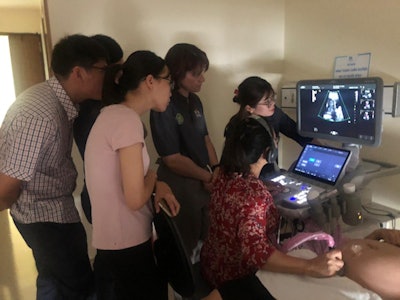 Volunteer sonographer Catherine Robinson provides hands-on training in south-east Asia as a part of the VITAL program, which addressed breast malignancy and ob/gyn ultrasound. The first recipient nation was Samoa.
Volunteer sonographer Catherine Robinson provides hands-on training in south-east Asia as a part of the VITAL program, which addressed breast malignancy and ob/gyn ultrasound. The first recipient nation was Samoa.This training was so successful that the plan was to extend it to Mongolia and the Cook Islands in 2020. While the plans were canceled due to the pandemic, RAB provided online training notes and in 2021 will launch virtual training through weekend teleconferences that will also extend to pediatrics and cover topics such as common abdominal and chest conditions, and complications.
"COVID has hampered much of the face-to-face work that RAB carries out across 12 nations including Cambodia, Mongolia, Sri Lanka, Laos, Vietnam, Myanmar, and six countries in the Pacific, but projects that have turned virtual for 2021 are planned to return onsite in 2022," de Silva said.
Individuals and sites can still access free video content in the RAB library, he added. To date there have been 1500 lessons provided by 70 to 80 contributing RAB members and 26,000 hits of these in the last 10 months.
RAB is now looking for colleges in Europe or elsewhere who may be interested in providing material for this library. These colleges will be credited for the content and become part of the charity's network.
"Our aim is to make the library the best free resource available," de Silva noted.





